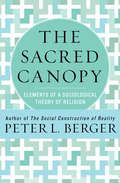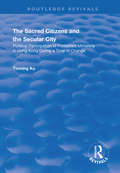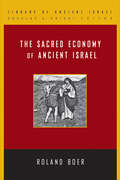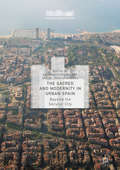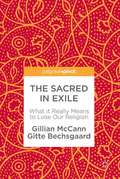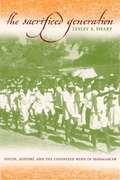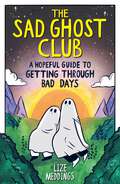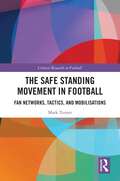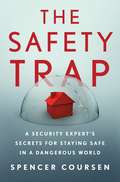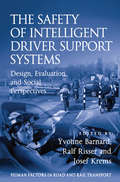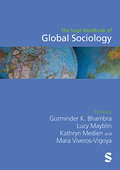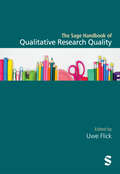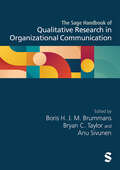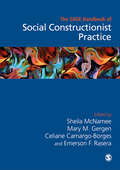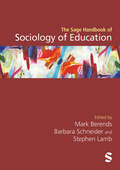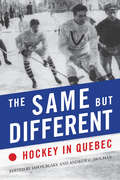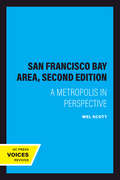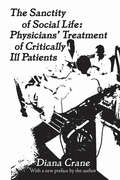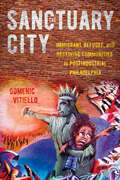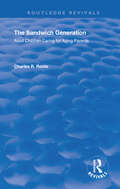- Table View
- List View
The Sacred Canopy: Elements of a Sociological Theory of Religion
by Peter L. Berger&“The most important contribution to the sociology of religion since Max Weber&’s The Protestant Ethic and the Spirit of Capitalism&” (Commonweal). Acclaimed scholar and sociologist Peter L. Berger carefully lays out an understanding of religion as a historical, societal mechanism in this classic work of social theory. Berger examines the roots of religious belief and its gradual dissolution in modern times, applying a general theoretical perspective to specific examples from religions throughout the ages. Building upon the author&’s previous work, The Social Construction of Reality, with Thomas Luckmann, this book makes Berger&’s case that human societies build a &“sacred canopy&” to protect, stabilize, and give meaning to their worldview.
The Sacred Citizens and the Secular City: Political Participation of Protestant Ministers in Hong Kong (Routledge Revivals)
by Tinming KoThis title was first published in 2000. This study addresses the political participation of Protestant ministers in Hong Kong. It aims to describe and explain the pattern of political participation of these ministers. The book focuses on a number of key questions. What kind of political participation did Protestant ministers involve themselves in during the years preceding the return to Chinese sovereignty? How extensive was their political involvement? Why were some ministers active and energetic political participants whereas some of their colleagues were inactive? How did the activists see their role as Christian ministers? What impact did the political activism of the Protestant clergy have on the social, political and religious development of Hong Kong? Dr Ko's findings offer insights into the political beliefs, values and activities of a sample of the Protestant clergy of Hong Kong and into their thinking about their political responsibilities.
The Sacred Economy of Ancient Israel
by Roland BoerThe Sacred Economy of Ancient Israel offers a new reconstruction of the economic context of the Bible and of ancient Israel. It argues that the key to ancient economies is with those who worked on the land rather than in intermittent and relatively weak kingdoms and empires. Drawing on sophisticated economic theory (especially the R#65533;gulation School) and textual and archaeological resources, Roland Boer makes it clear that economic "crisis" was the norm and that economics is always socially determined. He examines three economic layers: the building blocks (five institutional forms), periods of relative stability (three regimes), and the overarching mode of production. Ultimately, the most resilient of all the regimes was subsistence survival, for which the regular collapse of kingdoms and empires was a blessing rather than a curse. Students will come away with a clear understanding of the dynamics of the economy of ancient Israel. Boer's volume should become a new benchmark for future studies.
The Sacred and Modernity in Urban Spain
by Antonio Cordoba Daniel García-DonosoThis book explores how modernity, the urban, and the sacred overlap in fundamental ways in contemporary Spain. Urban spaces have traditionally been seen as the original sites of modernity, history, progress, and a Weberian systematic disenchantment of the world, while the sacred has been linked to the natural, the rural, mythical past origins, and exemption from historical change. This collection problematizes such clear-cut distinctions as overlaps between the modern urban and the sacred in Spanish culture are explored throughout the volume. Placed in the periphery of Europe, Spain has had a complex relationship with the concept of modernity and commonly understood processes of modernization and secularization, thus offering a unique case-study of the interaction between the modern and the sacred in the city.
The Sacred in Exile: What It Really Means To Lose Our Religion
by Gillian Mccann Gitte BechsgaardThis book addresses the fact that, for the first time in history, a large segment of the population in the western world is living without any form of religious belief. While a number of writers have examined the implications of this shift, none have approached the phenomenon from the perspective of religious studies. The authors examine what has been lost from the point of view of sociology, psychology, and philosophy of religion. The book sits at the nexus of a number of important debates including: the role of religion in public life, the connection between religion and physical and psychological well-being, and the implications of the loss of ritual in terms of maintaining communities.
The Sacrificed Generation: Youth, History, and the Colonized Mind in Madagascar
by Lesley A. SharpYouth, historical consciousness, and political agency in independent Francophone Africa are the themes that frame this study about Madagascar.
The Sad Ghost Club: A Hopeful Guide to Getting Through Bad Days (The Sad Ghost Club #4)
by Lize MeddingsWelcome to the Sad Ghost Club - a club for anyone who has ever felt sad or lost. We can all feel anxious and alone sometimes. Like you're almost . . . invisible. But at the Sad Ghost Club, you can find your kindred spirits and know you're not alone. In this graphic novel, discover the Sad Ghost Club's rules for taking things one day at a time. With heartwarming and very relatable comic illustrations, discover how to make it through the day, grow through the hard stuff and look out for your fellow ghosties. Based on the Sad Ghost Club community, with over 600k followers on Instagram. This is a place where everyone is accepted and everyone belongs.Join the community of ghosties on Instagram @theofficialsadghostclub
The Safe Standing Movement in Football: Fan Networks, Tactics, and Mobilisations (Critical Research in Football)
by Mark TurnerThis book tells the important story of the 30-year social movement against all-seated stadia in football in England and Wales that developed in the wake of the Hillsborough stadium disaster and the wider European and international significance of that movement. Examining the fan networks, relations, tactics and interactions which built the ‘Safe Standing’ movement, it reveals an untold social history of football supporter activism and represents an important contribution to our understanding of football supporter-based social movements, the sociology of football, and to social movement studies more broadly. The book argues that Safe Standing is sociologically highly significant because the restriction and partial exclusion of football fans as a social group in the timescape of English football after Hillsborough marked a moment of profound social change in the UK. Applying relational sociology, and drawing on original research and insider access, the book considers how events and ruptures, like Hillsborough, shape the dynamics of a social movement, and shows how supporters, who have been deeply affected by the all-seating legislation, are now in a position to affect the future consumption of football. The book shows how this was achieved, how a small core network of approximately 30 supporters, networked with supporter groups across Europe, now stand to impact and shape the consumption habits of a key leisure practice all over the world. This is fascinating reading for any student, researcher or policy-maker with an interest in football, sociology, political science, public policy, or cultural and social history.
The Safety Trap: A Security Expert's Secrets for Staying Safe in a Dangerous World
by Spencer CoursenThreat management expert Spencer Coursen offers proactive strategies to protect yourself and your loved ones in the event of hostile encounters and emergency situations in The Safety Trap: A Security Expert’s Secrets for Staying Safe in a Dangerous World.Despite what the news and social media would have you believe, we have never lived in a safer time than we are now. Unfortunately, we live under a false sense of security enforced by authorities that only alleviates fears without reducing risk. We have placed our personal safety, and our responsibilities of guarding it, into the hands of people trained only to respond to crises, not actively prevent them. Our blind faith in institutions to protect us has only dulled our natural survival instincts. The truth is that when we feel safest is actually when we are in the most danger.This is the paradox of The Safety Trap.When you don’t expect danger, you simply fail to see the signs that something bad is about to happen. But the signs are always there, and staying safe is about training yourself to see them. In easy-to-implement methods of maintaining vigilance, assessing risk, and taking preventative measures, you’ll discover how to be alert without anxiety and know how to best protect and defend yourself on the job, in school, in public places, at home, and online.With Coursen’s simple formula of Awareness + Preparation = Safety as your guide—as well as real world examples of managing threats—you will learn how to develop the skills and confidence to reclaim your own security and avoid The Safety Trap.
The Safety of Intelligent Driver Support Systems: Design, Evaluation and Social Perspectives (Human Factors in Road and Rail Transport)
by Ralf RisserThe development of new technologies of information and communication will, in the coming years, transform deeply their uses and practices in transport. The current developments in the field of road telematics and driver assistance systems offer a real opportunity to aid mobility and road safety. However, they also raise numerous questions about their effectiveness, possible positive and negative modifications of behaviour or attitudes and about their acceptability by drivers. Problems related to the design and evaluation of intelligent driver support systems (IDSSs) and social perspectives related to their introduction on a large scale may only be fully addressed from a multi-disciplinary point of view. People from different backgrounds, from both engineering and social sciences, should be involved in this development. This book provides such knowledge from both a human and social factors background. The Safety of Intelligent Driver Support Systems serves the training of professionals working within the transport area so that they can use this knowledge in their work. It will be of direct interest to transportation and traffic professionals, engineers, system designers, researchers and specialists working in automotive and related industries, departments of transport, and communication and public bodies related to transport in the automotive industry, public authorities, etc. Also students at Masters and PhD level, performing studies in the road transportation area, will find in this book a rich source of knowledge. Teachers and trainers, both in professional training and academic education, may use the book as a basis for giving a course on the topic addressed.
The Sage Handbook of Global Sociology
by Gurminder K. Bhambra Lucy Mayblin Kathryn Medien Mara Viveros-VigoyaThe SAGE Handbook of Global Sociology addresses the ‘social’, its various expressions globally, and the ways in which such understandings enable us to understand and account for global structures and processes. It demonstrates the vitality of thought from around the world by connecting theories and traditions, including reflections on European colonization, to build shared, rather than universal, understandings. Across 36 chapters, the Handbook offers a series of perspectives and cases from different locations, enabling the reader better to understand the particularities of specific contexts and how they are connected to global movements and structures. By moving beyond standard accounts of sociology and social theory, this Handbook offers both valuable insight into and scholarly contribution to the field of global sociology. Part 1: Politics Part 2: Labour Part 3: Kinship Part 4: Belief Part 5: Technology Part 6: Ecology
The Sage Handbook of Global Sociology
by Gurminder K. Bhambra Lucy Mayblin Kathryn Medien Mara Viveros-VigoyaThe SAGE Handbook of Global Sociology addresses the ‘social’, its various expressions globally, and the ways in which such understandings enable us to understand and account for global structures and processes. It demonstrates the vitality of thought from around the world by connecting theories and traditions, including reflections on European colonization, to build shared, rather than universal, understandings. Across 36 chapters, the Handbook offers a series of perspectives and cases from different locations, enabling the reader better to understand the particularities of specific contexts and how they are connected to global movements and structures. By moving beyond standard accounts of sociology and social theory, this Handbook offers both valuable insight into and scholarly contribution to the field of global sociology. Part 1: Politics Part 2: Labour Part 3: Kinship Part 4: Belief Part 5: Technology Part 6: Ecology
The Sage Handbook of Qualitative Research Quality
by Uwe FlickThis Sage Handbook presents an interdisciplinary collection of chapters exploring how to assess the quality of collecting and analysing qualitative data, while maintaining a focus on diversity, digital and critical approaches. The Handbook considers essential questions such as what is good qualitative research? What makes qualitative research good research? And, how can we make qualitative research better research? Contributions come from a wide array of experts, and highlight answers to questions from various disciplinary and geographical areas; from mixed methods to multimodal and online research, from specific types of data and methods to specific target groups, and from theoretical and epistemological contexts to those where funding has an impact on how research is done and assessed. Qualitative research has evolved in many respects in recent decades and has grown increasingly multidisciplinary. Research in general is facing new challenges around how to take diversity and decolonisation into account in what researchers do, as well as how to produce and communicate qualitative research quality. This Handbook offers a timely overview of such developments, and will support researchers involved in planning, designing, doing and evaluating qualitative research in developing an increased sensitivity for contemporary debates and challenges in the field. Part I Philosophies and Epistemologies of Qualitative Research Quality Part II Disciplinary Discourses of Qualitative Research Quality Part III Qualitative Research Quality for Specific Approaches Part IV Rethinking Qualitative Research Quality for Specific Methods and Data Part V Rethinking Strategies for Quality in Qualitative Research Part VI Rethinking Criteria for Quality in Qualitative Research Part VII Extending Contexts and Challenges for Qualitative Research Quality
The Sage Handbook of Qualitative Research Quality
by Uwe FlickThis Sage Handbook presents an interdisciplinary collection of chapters exploring how to assess the quality of collecting and analysing qualitative data, while maintaining a focus on diversity, digital and critical approaches. The Handbook considers essential questions such as what is good qualitative research? What makes qualitative research good research? And, how can we make qualitative research better research? Contributions come from a wide array of experts, and highlight answers to questions from various disciplinary and geographical areas; from mixed methods to multimodal and online research, from specific types of data and methods to specific target groups, and from theoretical and epistemological contexts to those where funding has an impact on how research is done and assessed. Qualitative research has evolved in many respects in recent decades and has grown increasingly multidisciplinary. Research in general is facing new challenges around how to take diversity and decolonisation into account in what researchers do, as well as how to produce and communicate qualitative research quality. This Handbook offers a timely overview of such developments, and will support researchers involved in planning, designing, doing and evaluating qualitative research in developing an increased sensitivity for contemporary debates and challenges in the field. Part I Philosophies and Epistemologies of Qualitative Research Quality Part II Disciplinary Discourses of Qualitative Research Quality Part III Qualitative Research Quality for Specific Approaches Part IV Rethinking Qualitative Research Quality for Specific Methods and Data Part V Rethinking Strategies for Quality in Qualitative Research Part VI Rethinking Criteria for Quality in Qualitative Research Part VII Extending Contexts and Challenges for Qualitative Research Quality
The Sage Handbook of Qualitative Research in Organizational Communication
by Bryan C. Taylor Boris H. J. M. Brummans Anu SivunenThe Sage Handbook of Qualitative Research in Organizational Communication is a state-of-the-art resource for scholars, students, and practitioners seeking to deepen their understanding and expertise in this dynamic field. Written by a global team of established and emerging experts, this Handbook provides a comprehensive exploration of the field’s foundational traditions of epistemology and theory, as well as its latest methodologies, methods, issues, and debates. The volume reflects a diverse range of approaches (e.g., mixed-methods, ethnographic, rhetorical, pragmatist, phenomenological, feminist, critical race, postcolonial, queer, and engaged), and covers a broad spectrum of topics ranging from data collection and analysis, to representation. Additionally, this Handbook addresses emerging trends such as digital forensics, post-qualitative research, and the transformative impact of COVID-19 on the conduct of qualitative research in organizational communication. As the first volume of its kind in this field, The Sage Handbook of Qualitative Research in Organizational Communication is a cornerstone text for scholars, students, and practitioners interested in understanding the vital role of communication in organizational life. Part 1: Approaches to Qualitative Organizational Communication Research Part 2: Data Collection in Qualitative Organizational Communication Research: Methods and Issues Part 3: Data Analysis and Representation in Qualitative Organizational Communication Research: Methods and Issues Part 4: The Future of Qualitative Organizational Communication Research
The Sage Handbook of Qualitative Research in Organizational Communication
by Bryan C. Taylor Boris H. J. M. Brummans Anu SivunenThe Sage Handbook of Qualitative Research in Organizational Communication is a state-of-the-art resource for scholars, students, and practitioners seeking to deepen their understanding and expertise in this dynamic field. Written by a global team of established and emerging experts, this Handbook provides a comprehensive exploration of the field’s foundational traditions of epistemology and theory, as well as its latest methodologies, methods, issues, and debates. The volume reflects a diverse range of approaches (e.g., mixed-methods, ethnographic, rhetorical, pragmatist, phenomenological, feminist, critical race, postcolonial, queer, and engaged), and covers a broad spectrum of topics ranging from data collection and analysis, to representation. Additionally, this Handbook addresses emerging trends such as digital forensics, post-qualitative research, and the transformative impact of COVID-19 on the conduct of qualitative research in organizational communication. As the first volume of its kind in this field, The Sage Handbook of Qualitative Research in Organizational Communication is a cornerstone text for scholars, students, and practitioners interested in understanding the vital role of communication in organizational life. Part 1: Approaches to Qualitative Organizational Communication Research Part 2: Data Collection in Qualitative Organizational Communication Research: Methods and Issues Part 3: Data Analysis and Representation in Qualitative Organizational Communication Research: Methods and Issues Part 4: The Future of Qualitative Organizational Communication Research
The Sage Handbook of Social Constructionist Practice
by Mary M. Gergen Sheila McNamee Celiane Camargo-Borges Emerson F. RaseraThe SAGE Handbook of Social Constructionist Practice is a major review of one of the key theories within psychology and the social sciences. Social construction is one of the main theoretical approaches within the social sciences to emerge out of the turn of the 20th century, and this volume showcases the latest theory and application of social construction across a range of disciplines. This review of the field is very timely, and exhibits the latest research whilst also pointing to future directions. The handbook brings together work from a range of disciplines and focuses on real-world practice in addition to theoretical work, thus making it useful for advanced students, scholars, and practitioners alike. Part One: Research Practices Part Two: Practices in the Caring Professions Part Three: Organizational Development Part Four: Education Part Five: Healthcare Part Six: Dialogue and Peace Building Part Seven: Community Building, Social Welfare, and Spirituality
The Sage Handbook of Social Constructionist Practice
by Mary M. Gergen Sheila McNamee Celiane Camargo-Borges Emerson F. RaseraThe SAGE Handbook of Social Constructionist Practice is a major review of one of the key theories within psychology and the social sciences. Social construction is one of the main theoretical approaches within the social sciences to emerge out of the turn of the 20th century, and this volume showcases the latest theory and application of social construction across a range of disciplines. This review of the field is very timely, and exhibits the latest research whilst also pointing to future directions. The handbook brings together work from a range of disciplines and focuses on real-world practice in addition to theoretical work, thus making it useful for advanced students, scholars, and practitioners alike. Part One: Research Practices Part Two: Practices in the Caring Professions Part Three: Organizational Development Part Four: Education Part Five: Healthcare Part Six: Dialogue and Peace Building Part Seven: Community Building, Social Welfare, and Spirituality
The Sage Handbook of Sociology of Education
by Mark Berends Barbara Schneider Stephen LambThe Sage Handbook of Sociology of Education is an international and comprehensive groundbreaking text that serves as a touchstone for researchers and scholars interested in exploring the intricate relationships between education and society. Leading sociologists from five different continents examine major topics in sociology from a global perspective. This timely, thought-provoking Handbook features contributions from leading and emerging sociology scholars, who provide their own cultural and historical perspectives on diverse—yet universal—topics; these include educational policy, social stratification, and cross-national research. 39 Chapters delve into the pressing issues faced by our global society, such as the effects of residential mobility on educational outcomes, gender and ethnic inequalities, and the impact of COVID-19 on early childhood education. Readers will gain a multifaceted view of the contours of educational inequality, from various international perspectives and focusing on country differences, as well as recommendations for expanding the practices, programs, and policies that could reduce the rising tide of inequities—especially for populations most at risk. This Handbook offers rich, diverse perspectives on the interplay between education, social inequality, and human rights around the world, making it an invaluable resource for students, researchers, and practitioners across a range of fields, including sociology, education, and social policy. PART 1: Education and Persistent Inequality PART 2: Social & Family Contexts PART 3: Schools & Educational Policy PART 4: Neighborhoods & Community PART 5: Education & Innovation in a Global Context
The Sage Handbook of Sociology of Education
by Mark Berends Barbara Schneider Stephen LambThe Sage Handbook of Sociology of Education is an international and comprehensive groundbreaking text that serves as a touchstone for researchers and scholars interested in exploring the intricate relationships between education and society. Leading sociologists from five different continents examine major topics in sociology from a global perspective. This timely, thought-provoking Handbook features contributions from leading and emerging sociology scholars, who provide their own cultural and historical perspectives on diverse—yet universal—topics; these include educational policy, social stratification, and cross-national research. 39 Chapters delve into the pressing issues faced by our global society, such as the effects of residential mobility on educational outcomes, gender and ethnic inequalities, and the impact of COVID-19 on early childhood education. Readers will gain a multifaceted view of the contours of educational inequality, from various international perspectives and focusing on country differences, as well as recommendations for expanding the practices, programs, and policies that could reduce the rising tide of inequities—especially for populations most at risk. This Handbook offers rich, diverse perspectives on the interplay between education, social inequality, and human rights around the world, making it an invaluable resource for students, researchers, and practitioners across a range of fields, including sociology, education, and social policy. PART 1: Education and Persistent Inequality PART 2: Social & Family Contexts PART 3: Schools & Educational Policy PART 4: Neighborhoods & Community PART 5: Education & Innovation in a Global Context
The Same but Different: Hockey in Quebec
by Jason Blake Andrew C. HolmanFrom coast to coast, hockey is played, watched, loved, and detested, but it means something different in Quebec. Although much of English Canada believes that hockey is a fanatically followed social unifier in the French-speaking province, in reality it has always been politicized, divided, and troubled by religion, class, gender, and language. In The Same but Different, writers from inside and outside Quebec assess the game’s history and culture in the province from the nineteenth century to the present. This volume surveys the past and present uses of hockey and how it has been represented in literature, drama, television, and autobiography. While the legendary Montreal Canadiens loom throughout the book’s chapters, the collection also discusses Quebecers’ favourite sport beyond the team’s shadow. Employing a broad range of approaches including study of gender, memory, and culture, the authors examine how hockey has become a lightning rod for discussions about Québécois identity. Hockey reveals much about Quebec and its relationship with the rest of Canada. The Same but Different brings new insights into the celebrated game as a site for community engagement, social conflict, and national expression.
The San Francisco Bay Area, Second Edition: A Metropolis in Perspective
by Mel ScottThis title is part of UC Press's Voices Revived program, which commemorates University of California Press’s mission to seek out and cultivate the brightest minds and give them voice, reach, and impact. Drawing on a backlist dating to 1893, Voices Revived makes high-quality, peer-reviewed scholarship accessible once again using print-on-demand technology. This title was originally published in 1985.
The Sanctity of Social Life: Physicians Treatment of Critically Ill Patients
by Diana CraneFor years, speculation has been mounting among lawyers, church leaders, social scientists, and the general public over the question of prolongation of life and the critically ill patient's "right to die." But what is the physician's attitude toward this controversial subject? Under what conditions does a doctor battle to save the life of the patient, and when does he decide to withdraw medical treatment and allow death to occur? The answers to these questions form the basis of this book, a fascinating examination of the nature of death and dying, as seen from the physician' point of view.
The Sanctuary City: Immigrant, Refugee, and Receiving Communities in Postindustrial Philadelphia
by Domenic VitielloIn The Sanctuary City, Domenic Vitiello argues that sanctuary means much more than the limited protections offered by city governments or churches sheltering immigrants from deportation. It is a wider set of protections and humanitarian support for vulnerable newcomers. Sanctuary cities are the places where immigrants and their allies create safe spaces to rebuild lives and communities, often through the work of social movements and community organizations or civil society. Philadelphia has been an important center of sanctuary and reflects the growing diversity of American cities in recent decades. One result of this diversity is that sanctuary means different things for different immigrant, refugee, and receiving communities. Vitiello explores the migration, settlement, and local and transnational civil society of Central Americans, Southeast Asians, Liberians, Arabs, Mexicans, and their allies in the region across the late twentieth and early twenty-first centuries. Together, their experiences illuminate the diversity of immigrants and refugees in the United States and what is at stake for different people, and for all of us, in our immigration debates.
The Sandwich Generation: Adult Children Caring for Aging Parents (Garland Studies On The Elderly In America Ser.)
by Charles R. RootsFirst published in 1998. The purpose of this book is to consider all aspects of having to care for elderly parents, while taking care of children still at home. Most of us have a general idea of how to raise children in the home, but just how do you care for an elderly parent? The focus is on the family, and the responsibilities that are based on scripture, society, and family upbringing. The thrust of this book is to ferret out the real issues of being a parent to both your children and your parent(s).
